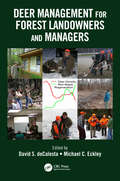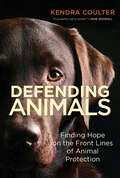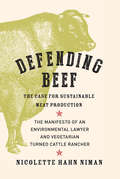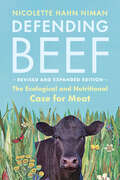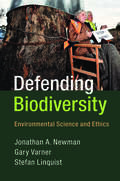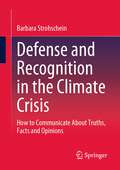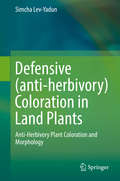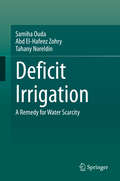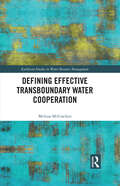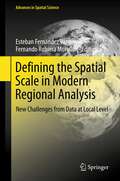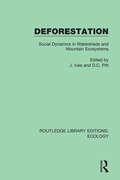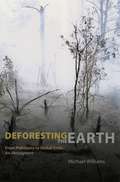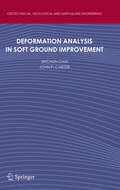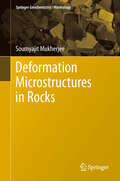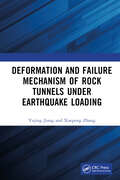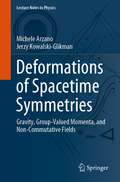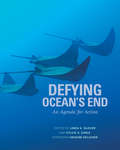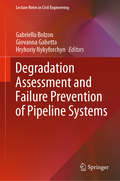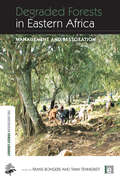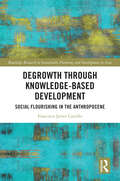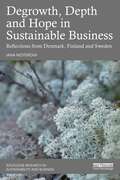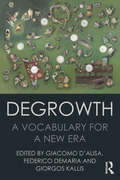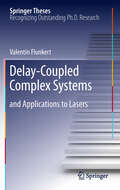- Table View
- List View
Deer Management for Forest Landowners and Managers
by David S. deCalesta and Michael C. EckleyThis book is designed to help landowners and forestry professionals develop, implement, and monitor programs to manage both deer and forests with emphasis on resolving deer impact issues. Chapters cover management strategies through identifying and setting goals; managing deer populations and deer impact on land; economics of forest, deer, and impact management; human dimensions of deer management; and developing and implementing integrated management plans. The book presents an integrated, quantitative approach for managing deer populations and impacts so users can manage forest resources sustainably.
Defending Animals: Finding Hope on the Front Lines of Animal Protection
by Kendra CoulterAn in-depth look at the urgent struggle to protect animals from harm, cruelty, injustice, extinction, and their greatest threat—us.Beloved dogs and cats. Magnificent horses and mountain gorillas. Curious chickens. What do we actually do to protect animals from harm—and is it enough? This engaging book provides a unique and eye-opening exploration of the world of animal protection as people defend diverse animals from injustice and cruelty. From the streets of major US cities to remote farms and tropical forests, Defending Animals is a gritty and moving portrait of the real work of animal protection that takes place in communities, courtrooms, and boardrooms.Globally recognized expert Kendra Coulter takes readers across the different landscapes of animal protection to meet people and animals of all kinds, from cruelty investigators to forensic veterinarians, wildlife rehabilitators and conservation leaders to animal lawyers and entrepreneurs, each working in their own ways to defend animals. Bringing unparalleled research and a distinct and nuanced analytical viewpoint, Defending Animals shows that animal protection is not only physical, intellectual, and emotional work but also a labor so rooted in empathy and care that it just might bridge the vast divide between polarized people and help create a more humane future for us all.
Defending Beef: The Case for Sustainable Meat Production
by Nicolette Hahn NimanFor decades it has been nearly universal dogma among environmentalists and health advocates that cattle and beef are public enemy number one. But is the matter really so clear cut? Hardly, argues environmental lawyer turned rancher Nicolette Hahn Niman in her new book, Defending Beef. The public has long been led to believe that livestock, especially cattle, erode soils, pollute air and water, damage riparian areas, and decimate wildlife populations. In Defending Beef, Hahn Niman argues that cattle are not inherently bad for either the Earth or our own nutritional health. In fact, properly managed livestock play an essential role in maintaining grassland ecosystems by functioning as surrogates for herds of wild ruminants that once covered the globe. Hahn Niman argues that dispersed, grass-fed, small-scale farms can and should become the basis for American food production, replacing the factory farms that harm animals and the environment. The author--a longtime vegetarian--goes on to dispel popular myths about how eating beef is bad for our bodies. She methodically evaluates health claims made against beef, demonstrating that such claims have proven false. She shows how foods from cattle--milk and meat, particularly when raised entirely on grass--are healthful, extremely nutritious, and an irreplaceable part of the world's food system. Grounded in empirical scientific data and with living examples from around the world, Defending Beef builds a comprehensive argument that cattle can help to build carbon-sequestering soils to mitigate climate change, enhance biodiversity, help prevent desertification, and provide invaluable nutrition. Defending Beef is simultaneously a book about big ideas and the author's own personal tale--she starts out as a skeptical vegetarian and eventually becomes an enthusiastic participant in environmentally sustainable ranching. While no single book can definitively answer the thorny question of how to feed the Earth's growing population, Defending Beef makes the case that, whatever the world's future food system looks like, cattle and beef can and must be part of the solution.
Defending Beef: The Ecological and Nutritional Case for Meat, 2nd Edition
by Nicolette Hahn Niman&“Nicolette Hahn Niman sets out to debunk just about everything you think you know . . . She&’s not trying to change your mind; she&’s trying to save your world.&”—Los Angeles Times &“Elegant, strongly argued.&”—The Atlantic (named a &“Best Food Book&”)As the meat industry—from small-scale ranchers and butchers to sprawling slaughterhouse operators—responds to COVID-19, the climate threat, and the rise of plant-based meats, Defending Beef delivers a passionate argument for responsible meat production and consumption–in an updated and expanded new edition.For decades it has been nearly universal dogma among environmentalists that many forms of livestock—goats, sheep, and others, but especially cattle—are Public Enemy Number One. They erode soils, pollute air and water, damage riparian areas, and decimate wildlife populations. As recently as 2019, a widely circulated Green New Deal fact sheet even highlighted the problem of &“farting cows.&” But is the matter really so clear-cut? Hardly. In Defending Beef, Second Edition, environmental lawyer turned rancher Nicolette Hahn Niman argues that cattle are not inherently bad for the earth. The impact of grazing can be either negative or positive, depending on how livestock are managed. In fact, with proper oversight, livestock can play an essential role in maintaining grassland ecosystems by performing the same functions as the natural herbivores that once roamed and grazed there.With more public discussions and media being paid to connections between health and diet, food and climate, and climate and farming—especially cattle farming, Defending Beef has never been more timely. And in this newly revised and updated edition, the author also addresses the explosion in popularity of &“fake meat&” (both highly processed &“plant-based foods&” and meat grown from cells in a lab, rather than on the hoof).Defending Beef is simultaneously a book about big issues and the personal journey of the author, who continues to fight for animal welfare and good science. Hahn Niman shows how dispersed, grass-based, smaller-scale farms can and should become the basis of American food production.&“Creating healthful, delicious food in ecological balance is among humanity&’s greatest challenges. In this insightful book, Nicolette Hahn Niman shows why cattle on grass are an essential element. Every chef in America should read this book.&”—Alice Waters, founder/owner, Chez Panisse, and author of We Are What We Eat&“Nicolette Hahn Niman just became beef&’s most articulate advocate. In Defending Beef, she pivots gracefully between the personal and the scientific, the impassioned and the evenhanded. It&’s a deeply compelling and delicious vision for the future of food.&”—Dan Barber, author of The Third Plate
Defending Biodiversity: Environmental Science and Ethics
by Newman Jonathan A. Gary Varner Stefan LinquistImagine that you are an environmentalist who passionately believes that it is wrong to drill for oil in the Arctic National Wildlife Refuge. How do you convince someone that a decision to drill is wrong? Debates about the environment and how humans ought to treat it have gone on for decades, yet arguments in favor of preserving biodiversity often lack empirical substance or are philosophically na#65533;ve, making them far less effective than they could be. This book critically examines arguments that are commonly offered in support of biodiversity conservation. The authors adopt a skeptical viewpoint to thoroughly test the strength of each argument and, by demonstrating how scientific evidence can be integrated with philosophical reasoning, they help environmentalists to better engage with public debate and judiciously inform public policy. This interdisciplinary and accessible book is essential reading for anyone who engages in discussions about the value of biodiversity conservation.
Defense and Recognition in the Climate Crisis: How to Communicate About Truths, Facts and Opinions
by Barbara StrohscheinTruths, facts and opinions on the climate issue are often met with psychological or social defense, both publicly and privately. Based on selected psychological and philosophical theories as well as data material, this book shows how defense comes about, how it works, and how, on the other hand, the necessary recognition can succeed on various levels. It is only through recognition that constructive discourse becomes possible. This book offers all the basics to be able to theoretically and practically solve communication conflicts between defense and recognition in the climate crisis.
Defensive (anti-herbivory) Coloration in Land Plants
by Simcha Lev-YadunThis book presents visual plant defenses (camouflage, mimicry and aposematism via coloration, morphology and even movement) against herbivores. It is mainly an ideological monograph, a manifesto representing my current understanding on defensive plant coloration and related issues. The book is not the final word in anything, but rather the beginning of many things. It aims to establish visual anti-herbivory defense as an integral organ of botany, or plant science as it is commonly called today. I think that like in animals, many types of plant coloration can be explained by selection associated with the sensory/cognitive systems of herbivores and predators to reduce herbivory. It is intended to intrigue and stimulate students of botany/plant science and plant/animal interactions for a very long time. This book is tailored to a readership of biologists and naturalists of all kinds and levels, and more specifically for botanists, ecologists, evolutionists and to those interested in plant/animal interactions. It is written from the point of view of a naturalist, ecologist and evolutionary biologist that I hold, considering natural selection as the main although not the only drive for evolution. According to this perspective, factors such as chance, founder effects, genetic drift and various stochastic processes that may and do influence characters found in specific genotypes, are not comparable in their power and influence to the common outcomes of natural selection, especially manifested when very many species belonging to different plant families, with very different and separate evolutionary histories, arrive at the same adaptation, something that characterizes many of the visual patterns and proposed adaptations described and discussed in this book. Many of the discussed visual defensive mechanisms are aimed at operating before the plants are damaged, i. e. , to be their first line of defense. In this respect, I think that the name of the book by Ruxton et al. (2004) "Avoiding Attack" is an excellent phrase for the assembly of the best types of defensive tactics. While discussing anti-herbivory, I do remember, study and teach physiological/developmental aspects of some of the discussed coloration patterns, and I am fully aware of the simultaneous and diverse functions of many plant characters in addition to defense.
Deficit Irrigation: A Remedy for Water Scarcity
by Samiha Ouda Tahany Noreldin Abd El-Hafeez ZohryThis book focuses on proving that deficit irrigation could play an important role in increasing food production in times of water scarcity. Although the application of deficit irrigation can involve loss in crop productivity, it still secures water to be use in cultivating more lands and producing more food. The following questions are discussed and the authors offer solutions to these problems:Will the production, on a national level, resulting from these new added areas compensate yield losses attained by application of deficit irrigation?Is it possible to use deficit irrigation practice to reduce the applied irrigation water to certain crops that have a surplus in their production, and direct this saved water to cultivate new areas with crops have low self-sufficiency ratios? Under climate change in 2030, would deficit irrigation practice have the same role it plays under the current conditions? This book will appeal to students and researchers involved with water scarcity and food security.
Defining Effective Transboundary Water Cooperation (Earthscan Studies in Water Resource Management)
by Melissa McCrackenThis book establishes a framework for defining transboundary water cooperation and a methodology for evaluating its effectiveness, which will contribute to more effective and therefore successful cooperation processes. With the increasing focus on transboundary cooperation as a part of the Sustainable Development Goal Framework, there is global recognition of transboundary water cooperation as a tool for improved governance and management of transboundary surface and groundwaters. However, there is not an agreed upon definition of transboundary water cooperation in the literature or in practice. This book develops the Four Frames of Transboundary Water Cooperation, which is a neutral modular framework for developing context-specific explanatory definitions of transboundary water cooperation in basins and aquifers. The Four Frames of Cooperation are legal, institutional, relational, and outcome. However, we need to move beyond defining cooperation to understand better measures of the quality and effectiveness of cooperative processes. The Weighted Model of Effective Cooperation presents a first step in qualitatively evaluating the effectiveness of transboundary water cooperation. This model defines effective transboundary water cooperation and operationalizes a method to evaluate the effectiveness of cooperative processes over internationally shared waters. Effective cooperation emphasizes the relational and outcome frames of cooperation while working towards equitability and sustainability. Together, the Four Frames of Cooperation and the Weighted Model of Effective Cooperation will improve the understanding of cooperation and encourage a detailed evaluation of the quality, success, and effectiveness of cooperative processes. This book will be of great interest to students and scholars of water resource management, water governance, and environmental politics. It will also appeal to policymakers and professionals working in the fields of water conflict, water diplomacy, and international cooperation.
Defining the Spatial Scale in Modern Regional Analysis
by Esteban Fernández Vázquez Fernando Rubiera MorollónThis book explores different approaches to defining the concept of region depending on the specific question that needs to be answered. While the typical administrative spatial data division fits certain research questions well, in many cases, defining regions in a different way is fundamental in order to obtain significant empirical evidence. The book is divided into three parts: The first part is dedicated to a methodological discussion of the concept of region and the different potential approaches from different perspectives. The problem of having sufficient information to define different regional units is always present. This justifies the second part of the book, which focuses on the techniques of ecological inference applied to estimating disaggregated data from observable aggregates. Finally, the book closes by presenting several applications that are in line with the functional areas definition in regional analysis.
Deforestation: Social Dynamics in Watersheds and Mountain Ecosystems (Routledge Library Editions: Ecology #5)
by J. Ives D. C. PittOriginally published in 1988 Deforestation examines deforestation as a major environmental and development problem. It examines the issues of forests being cut in tropical and mountain areas, and how acid rain, pollution and disease wreak havoc in temperate zones. Some of the worst effects of deforestation have been changes in the world’s climate system, erosion and flooding, desertification, wood short-ages and the disappearance of some floral and fauna species. This book challenges the belief that deforestation is due to entirely rapid population growth and agricultural expansion and emphasises the effects of commercial exploitation and poor planning and management. In concludes with a programme for reforestation using agro-forestry, appropriate cottage industries, improved international programmes, local land reforms and community participation.
Deforesting the Earth: From Prehistory to Global Crisis, An Abridgment
by Michael Williams“Anyone who doubts the power of history to inform the present should read this closely argued and sweeping survey. This is rich, timely, and sobering historical fare written in a measured, non-sensationalist style by a master of his craft. One only hopes (almost certainly vainly) that today’s policymakers take its lessons to heart.”—Brian Fagan, Los Angeles Times Published in 2002, Deforesting the Earth was a landmark study of the history and geography of deforestation. Now available as an abridgment, this edition retains the breadth of the original while rendering its arguments accessible to a general readership. Deforestation—the thinning, changing, and wholesale clearing of forests for fuel, shelter, and agriculture—is among the most important ways humans have transformed the environment. Surveying ten thousand years to trace human-induced deforestation’s effect on economies, societies, and landscapes around the world, Deforesting the Earth is the preeminent history of this process and its consequences. Beginning with the return of the forests after the ice age to Europe, North America, and the tropics, Michael Williams traces the impact of human-set fires for gathering and hunting, land clearing for agriculture, and other activities from the Paleolithic age through the classical world and the medieval period. He then focuses on forest clearing both within Europe and by European imperialists and industrialists abroad, from the 1500s to the early 1900s, in such places as the New World, India, and Latin America, and considers indigenous clearing in India, China, and Japan. Finally, he covers the current alarming escalation of deforestation, with our ever-increasing human population placing a potentially unsupportable burden on the world’s forests.
Deforesting the Earth: From Prehistory to Global Crisis, An Abridgment
by Michael Williams“Anyone who doubts the power of history to inform the present should read this closely argued and sweeping survey. This is rich, timely, and sobering historical fare written in a measured, non-sensationalist style by a master of his craft. One only hopes (almost certainly vainly) that today’s policymakers take its lessons to heart.”—Brian Fagan, Los Angeles Times Published in 2002, Deforesting the Earth was a landmark study of the history and geography of deforestation. Now available as an abridgment, this edition retains the breadth of the original while rendering its arguments accessible to a general readership. Deforestation—the thinning, changing, and wholesale clearing of forests for fuel, shelter, and agriculture—is among the most important ways humans have transformed the environment. Surveying ten thousand years to trace human-induced deforestation’s effect on economies, societies, and landscapes around the world, Deforesting the Earth is the preeminent history of this process and its consequences. Beginning with the return of the forests after the ice age to Europe, North America, and the tropics, Michael Williams traces the impact of human-set fires for gathering and hunting, land clearing for agriculture, and other activities from the Paleolithic age through the classical world and the medieval period. He then focuses on forest clearing both within Europe and by European imperialists and industrialists abroad, from the 1500s to the early 1900s, in such places as the New World, India, and Latin America, and considers indigenous clearing in India, China, and Japan. Finally, he covers the current alarming escalation of deforestation, with our ever-increasing human population placing a potentially unsupportable burden on the world’s forests.
Deformation Analysis in Soft Ground Improvement
by John P. Carter Jinchun ChaiThis book deals with the behaviour of soft ground improved by some of the more common methods, including the installation of prefabricated vertical drains (PVDs), or the installation of soil-cement columns formed by deep mixing, or the preloading of soft ground by application of a vacuum pressure in addition to, or instead of, a surcharge loading. In particular, it describes the theories and the numerical modelling techniques that may be applied to these soft ground improvement schemes to estimate the immediate and time-dependent mechanical response of the in situ soil. Particular emphasis has been placed on methods that reliably predict ground deformations associated with ground improvement techniques. The book commences with a brief description of the various ground improvement methods and then describes general techniques for modelling the behaviour of soft clay subsoils by the finite element method, as well as details of the methods for modelling soft soils improved by the installation of PVDs. It also includes chapters describing the theory of vacuum consolidation and methods for calculating vacuum pressure-induced ground deformation, as well as a theory which can be used to predict the response of soft ground improved by the installation of soil-cement columns. An important distinguishing feature of this book is the routine use of comparisons of predictions of the proposed models with the results of laboratory studies, and particularly field case studies, in order to validate the proposed methods of analysis. The field case histories are from soft soil sites at various locations around the world. The book is directed towards students of geotechnical engineering as well as geotechnical practitioners. In the main it provides complete derivations of most of the important theoretical results, as the intention was to write a book that could be used as both a teaching text and a reference work for students and practitioners. Audience: The book is intended for geotechnical practitioners as well as for students.
Deformation Microstructures in Rocks
by Soumyajit MukherjeeStudy of microstructures is an indispensable component of understanding structural geology of any terrain. A number of 'new' microscopic structures such as 'flanking microstructures', trapezoid-shaped mineral grains, reversal of ductile shear sense, micro-duplexes, V-pull aparts, and new minerals nucleating inside host minerals have recently been described in individual manuscripts. However, for the sake of brevity, microstructural papers cannot show all possible variation in their morphology. The proposed book aims to present these structures with attractive colour photographs. Each photomicrograph will have a comprehensive caption. The book also presents grain boundary migration, boudins, symptoms of metamorphic retrogression, and how well known shear sense indicators (S-C fabrics, mineral fish etc.) vary in morphology in serial-sections. The target audience is for graduate and postgraduate geosciences students and researchers of structural geology.
Deformation and Failure Mechanism of Rock Tunnels under Earthquake Loading
by Yujing Jiang Xuepeng ZhangSeismic damage to rock tunnels from recent earthquakes indicates an urgent need for seismic assessment and aseismic design of underground structures. This book offers a comprehensive account of seismic performance and the response of underground structures under earthquake loading, necessary for adequate assessment and design. The book presents research methods for the rate-dependent mechanical behavior of rock and for the seismic behavior of underground structures. It describes analytical solutions to investigate the seismic response of tunnels subjected to seismic waves, toward an improved quantitative understanding of the seismic deformation and failure mechanism in both longitudinal and transversal aspects. A performance-based restoration design criterion and aseismic design are also proposed for future tunnel planning. Includes a detailed case study for the seismic performance assessment of rock tunnels under earthquake loading Explores the relationship between seismic damage to underground structures and ground deformation Covers a range of issues from mechanisms, analysis, assessment and design of both new tunnels and restoration projects The book is ideal for earthquake engineers and researchers, and will also be of interest to contractors, clients, researchers, lecturers, and advanced students working on tunnel engineering.
Deformations of Spacetime Symmetries: Gravity, Group-Valued Momenta, and Non-Commutative Fields (Lecture Notes in Physics #986)
by Michele Arzano Jerzy Kowalski-GlikmanThis monograph provides an introduction to deformations of Poincaré symmetries focusing on models with a Lie group momentum space and associated non-commutative space-times. The emphasis is put on the emergence of such structures from quantum gravity, their mathematical features described in terms of Hopf algebras and applications to particle kinematics and field theory. Part I of this work focuses on the link between gravity and deformed symmetries in the case of 2+1 and 3+1 space-time dimensions. Part II is devoted to the description of classical particles with group valued momenta, their phase spaces and kinematics. The last part of these notes provides an introduction to the basic features of classical and quantum field theory on κ-Minkowski space-time, the prototypical example of non-commutative space-time exhibiting deformed Poincaré symmetry. The text, being the first providing a detailed overview of these topics, is primarily intended for researchers and graduate students interested in non-commutative field theories and quantum gravity phenomenology.
Defying Ocean's End: An Agenda For Action
by Sylvia Earle Linda Glover Graeme KelleherIf humankind were given a mandate to do everything in our power to undermine the earth's functioning, we could hardly do a better job than we have in the past thirty years on the world's oceans, both by what we are putting into it-millions of tons of trash and toxic materials-and by what we are taking out of it-millions of tons of wildlife. Yet only recently have we begun to understand the scale of those impacts. Defying Ocean's End is the result of an unprecedented effort among the world's largest environmental organizations, scientists, the business community, media, and international governments to address these marine issues. In June 2003, in the culmination of a year-long effort, they met specifically to develop a comprehensive and achievable agenda to reverse the decline in health of the world's oceans. As conservation organizations begin to expand their focus from land issues to include a major focus on preservation of the sea, it is increasingly apparent that we have to approach marine conservation differently and at much larger scale than we have to date. What's also clear is the magnitude and immediacy of the growing ocean concerns are such that no one organization can handle the job alone. Defying Ocean's End is a bold step in bringing the resources needed to bear on this vast problem before it is too late. It offers a broad strategy, a practical plan with priorities and costs, aimed at mobilizing the forces needed to bring about a "sea change" of favorable attitudes, actions, and outcomes for the oceans-and for all of us.
Degradation Assessment and Failure Prevention of Pipeline Systems (Lecture Notes in Civil Engineering #102)
by Giovanna Gabetta Gabriella Bolzon Hryhoriy NykyforchynThis book presents the results of the research project G5055 'Development of novel methods for the prevention of pipeline failures with security implications,' carried out in the framework of the NATO Science for Peace and Security program, and explores the lifecycle assessment of gas infrastructures. Throughout their service lives, pipelines transporting hydrocarbons are exposed to demanding working conditions and aggressive media. In long-term service, material aging increases the risk of damage and failure, which can be accompanied by significant economic losses and severe environmental consequences. This book presents a selection of complementary contributions written by experts operating in the wider fields of pipeline integrity; taken together, they offer a comprehensive portrait of the latest developments in this technological area.
Degraded Forests in Eastern Africa: Management and Restoration (The Earthscan Forest Library)
by Frans Bongers Timm TennigkeitForest degradation as a result of logging, shifting cultivation, agriculture and urban development is a major issue throughout the tropics. It leads to loss in soil fertility, water resources and biodiversity, as well as contributes to climate change. Efforts are therefore required to try to minimize further degradation and restore tropical forests in a sustainable way. This is the first research-based book to examine this problem in East Africa. The specific focus is on the forests of Ethiopia, Tanzania and Uganda, but the lessons learned are shown to be applicable to neighbouring countries and others in the tropics. A wide range of forest types are covered, from dry Miombo forest and afromontane forests, to forest-savannah mosaics and wet forest types. Current management practices are assessed and examples of good practice presented. The role of local people is also emphasized. The authors describe improved management and restoration through silviculture, plantation forestry and agroforestry, leading to improvements in timber production, biodiversity conservation and the livelihoods of local people.
Degrowth through Knowledge-Based Development: Social Flourishing in the Anthropocene (Routledge Research in Sustainable Planning and Development in Asia)
by Francisco Javier CarrilloThis book tackles the terms under which a knowledge-based society can indefinitely improve while pursuing an eco-economic steady state. In doing so, it addresses the literature gap on continued social improvement within a post-growth economic and cultural paradigm.Carrillo consolidates research on the Degrowth paradigm and proposes a conceptual framework for continued social improvement based on the integration of tangible and intangible collective values. He proposes a method that accounts for effective social value through capital systems valuation and development and includes this operational metric system as an alternative to the metric of Gross National Product (GNP). The book critically examines the challenges of identifying a complete and consistent representation of total social value. The book also includes a series of knowledge-based development programmes in cities and regions around the world and discusses policies and practices for urban mitigation and adaptation to the Anthropocene.This transdisciplinary book will be of particular interest to researchers of degrowth economics, sustainable development, and urban planning.
Degrowth, Depth and Hope in Sustainable Business: Reflections from Denmark, Finland and Sweden (Routledge Research in Sustainability and Business)
by Iana NesterovaThis book takes degrowth theorising in the direction of honouring collaboration, creating new dialogues and emphasising growth and human capacities. Traditionally, degrowth theorising has focussed on reduction and non‑growth. While the ecological concerns of degrowth scholarship are felt acutely by many, the suggestion of “less” can be experienced as undesirable, going against who we are as humans, and even be false in some industries and spaces. Indeed, for a degrowth society to come into being, unprecedented (though not materialistic) growth is needed. This book unpicks the business and sustainability framework rooted in degrowth scholarship and proposes a gentler approach to business for a sustainable society living harmoniously with nature. Drawing on case studies from Finland, Sweden and Denmark, Iana Nesterova reflects on how degrowth manifests in imperfect and nuanced ways and examines the ways in which businesses navigate creatively and cautiously challenging socio‑economic landscapes, and why they do this. She puts forward a new framework for growth within degrowth, centred around humanism and hope, which celebrates empathy, care, solidarity and connectedness with human and non‑human others and nature. Presenting an empowering and liberating view on sustainable business, this book will be of great interest to students and scholars of business ethics, ecological economics, business organisation and management.
Degrowth: A Vocabulary for a New Era (The\economy: Key Ideas Ser.)
by Giacomo D'Alisa Federico Demaria Giorgos KallisDegrowth is a rejection of the illusion of growth and a call to repoliticize the public debate colonized by the idiom of economism. It is a project advocating the democratically-led shrinking of production and consumption with the aim of achieving social justice and ecological sustainability. This overview of degrowth offers a comprehensive coverage of the main topics and major challenges of degrowth in a succinct, simple and accessible manner. In addition, it offers a set of keywords useful forintervening in current political debates and for bringing about concrete degrowth-inspired proposals at different levels - local, national and global. The result is the most comprehensive coverage of the topic of degrowth in English and serves as the definitive international reference. More information at: vocabulary.degrowth.org View the author spotlight featuring events and press related to degrowth at http://t.co/k9qbQpyuYp.
Delaware Water Gap National Recreation Area (Images of America)
by Laura ObisoEuropeans first settled in what was to become the Delaware Water Gap National Recreation Area (DWGNRA) in the 17th century. By the late 1800s, the Delaware Water Gap had become a popular vacation spot, attracting thousands to the palatial resorts in the mountains. Rural communities thrived in the valley until the 1960s. The DWGNRA was created in 1965 to oversee activities centered around a reservoir that was to be the result of a dam to be built on the Delaware River at Tocks Island. In anticipation of the dam, the government removed residents by purchasing or condemning property. An environmental and political war raged, and the dam was ultimately defeated. Although several historical sites were lost, many survived and a few have been restored. Today the DWGNRA is one of the country's most popular parks. Within its boundaries are rugged and beautiful wilderness, historic landmarks, and the wild and scenic Delaware River.
Delay-Coupled Complex Systems
by Valentin FlunkertThis work addresses time-delay in complex nonlinear systems and, in particular, its applications in complex networks; its role in control theory and nonlinear optics are also investigated. Delays arise naturally in networks of coupled systems due to finite signal propagation speeds and are thus a key issue in many areas of physics, biology, medicine, and technology. Synchronization phenomena in these networks play an important role, e.g., in the context of learning, cognitive and pathological states in the brain, for secure communication with chaotic lasers or for gene regulation. The thesis includes both novel results on the control of complex dynamics by time-delayed feedback and fundamental new insights into the interplay of delay and synchronization. One of the most interesting results here is a solution to the problem of complete synchronization in general networks with large coupling delay, i.e., large distances between the nodes, by giving a universal classification of networks that has a wide range of interdisciplinary applications.
